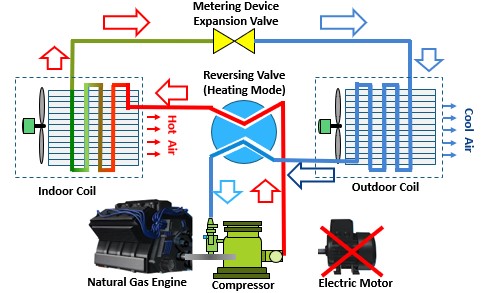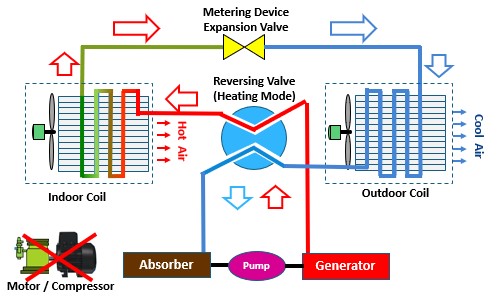Heat pumps are systems that transfer thermal energy from a heat source to a heat sink. The thermal energy is moved in a direction that is opposite to the direction of spontaneous heat flow. Heat pumps use energy to accomplish the desired transfer of thermal energy from heat source to heat sink. In short, a heat pump running in heating mode is nothing more than a standard air conditioner running in reverse, so instead of rejecting heat to the outdoors when cooling, it is extracting heat from the outdoor air and transferring that heat to the indoor space.
How Engine-Driven Heat Pumps Work
The engine-driven gas heat pump air conditioning systems utilizes an efficient reciprocating engine
running on a natural gas to produce the shaft horsepower to turn a scroll vapor compressor. In short, the
electric motor is replaced with a gas engine. The gas engine driven heat pump uses the same vapor
compression cycle as the electric heat pump. The primary advantage of an engine-driven heat pump is the
operating cost. The following image shows the system in heat mode.
Your content goes here. Edit or remove this text inline or in the module Content settings. You
can also style every aspect of this content in the module Design settings and even apply custom CSS to
this text in the module Advanced settings.

How Absorption Heat Pumps Work
The natural gas absorption heat pump differs from traditional electrical heat pumps. Instead of consuming
electric energy to operate a vapor compression cycle, the absorption heat pump consumes gas to heat a
solution of water and ammonia in a completely sealed absorption circuit.
In generic terms, absorption heat pumps are hydronic type systems, as they heat and/or cool the water that
is required. This system is like the vapor compression cycle, but instead of a motor and compressor, the
absorption system uses a generator, pump and absorber. The image below shows an absorption-based heat pump
in heating mode.
There are multiple absorption heat pumps configurations available:
- Air source, water source, or ground source (geo-thermal) systems
- Heating only, hot water up to 140°F
- Heating & cooling (reversible), hot water up to 140°F and chilled water down to 37.4°F
- Simultaneous heating and cooling
- Heat pump water heaters
